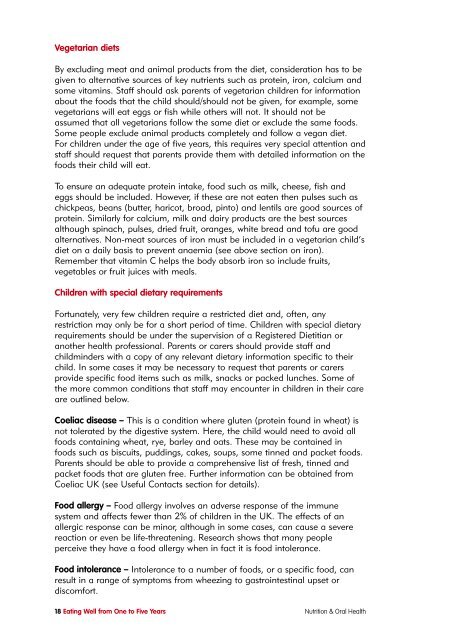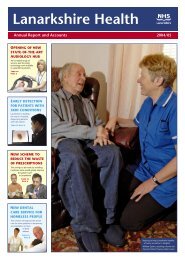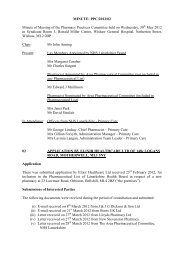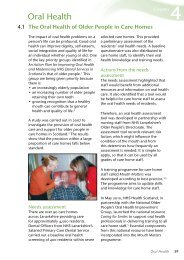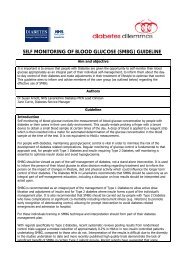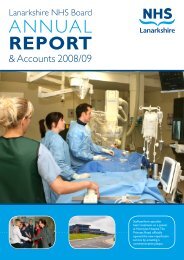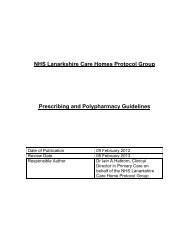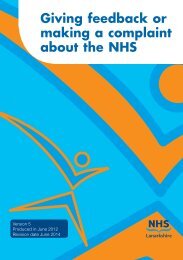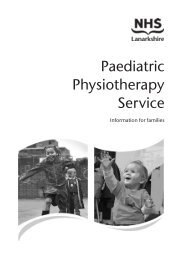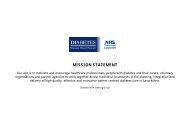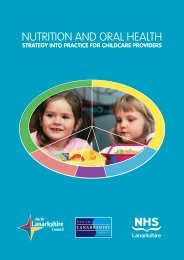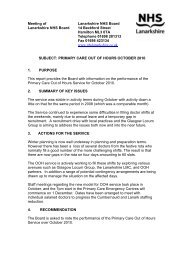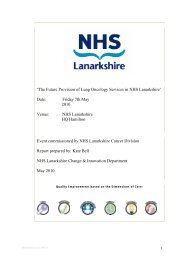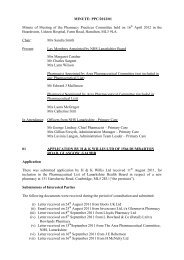Nutrition and Oral Health - NHS Lanarkshire
Nutrition and Oral Health - NHS Lanarkshire
Nutrition and Oral Health - NHS Lanarkshire
Create successful ePaper yourself
Turn your PDF publications into a flip-book with our unique Google optimized e-Paper software.
Vegetarian diets<br />
By excluding meat <strong>and</strong> animal products from the diet, consideration has to be<br />
given to alternative sources of key nutrients such as protein, iron, calcium <strong>and</strong><br />
some vitamins. Staff should ask parents of vegetarian children for information<br />
about the foods that the child should/should not be given, for example, some<br />
vegetarians will eat eggs or fish while others will not. It should not be<br />
assumed that all vegetarians follow the same diet or exclude the same foods.<br />
Some people exclude animal products completely <strong>and</strong> follow a vegan diet.<br />
For children under the age of five years, this requires very special attention <strong>and</strong><br />
staff should request that parents provide them with detailed information on the<br />
foods their child will eat.<br />
To ensure an adequate protein intake, food such as milk, cheese, fish <strong>and</strong><br />
eggs should be included. However, if these are not eaten then pulses such as<br />
chickpeas, beans (butter, haricot, broad, pinto) <strong>and</strong> lentils are good sources of<br />
protein. Similarly for calcium, milk <strong>and</strong> dairy products are the best sources<br />
although spinach, pulses, dried fruit, oranges, white bread <strong>and</strong> tofu are good<br />
alternatives. Non-meat sources of iron must be included in a vegetarian child’s<br />
diet on a daily basis to prevent anaemia (see above section on iron).<br />
Remember that vitamin C helps the body absorb iron so include fruits,<br />
vegetables or fruit juices with meals.<br />
Children with special dietary requirements<br />
Fortunately, very few children require a restricted diet <strong>and</strong>, often, any<br />
restriction may only be for a short period of time. Children with special dietary<br />
requirements should be under the supervision of a Registered Dietitian or<br />
another health professional. Parents or carers should provide staff <strong>and</strong><br />
childminders with a copy of any relevant dietary information specific to their<br />
child. In some cases it may be necessary to request that parents or carers<br />
provide specific food items such as milk, snacks or packed lunches. Some of<br />
the more common conditions that staff may encounter in children in their care<br />
are outlined below.<br />
Coeliac disease – This is a condition where gluten (protein found in wheat) is<br />
not tolerated by the digestive system. Here, the child would need to avoid all<br />
foods containing wheat, rye, barley <strong>and</strong> oats. These may be contained in<br />
foods such as biscuits, puddings, cakes, soups, some tinned <strong>and</strong> packet foods.<br />
Parents should be able to provide a comprehensive list of fresh, tinned <strong>and</strong><br />
packet foods that are gluten free. Further information can be obtained from<br />
Coeliac UK (see Useful Contacts section for details).<br />
Food allergy – Food allergy involves an adverse response of the immune<br />
system <strong>and</strong> affects fewer than 2% of children in the UK. The effects of an<br />
allergic response can be minor, although in some cases, can cause a severe<br />
reaction or even be life-threatening. Research shows that many people<br />
perceive they have a food allergy when in fact it is food intolerance.<br />
Food intolerance – Intolerance to a number of foods, or a specific food, can<br />
result in a range of symptoms from wheezing to gastrointestinal upset or<br />
discomfort.<br />
18 Eating Well from One to Five Years <strong>Nutrition</strong> & <strong>Oral</strong> <strong>Health</strong>


